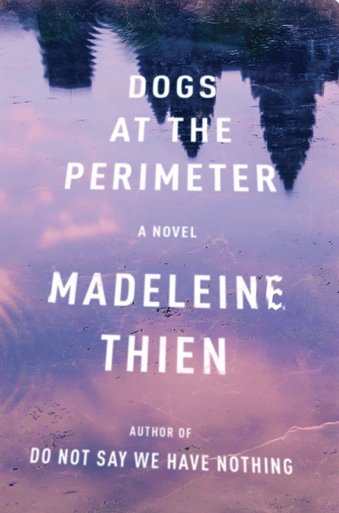Dogs at the Perimeter by Madeleine Thien (W.W. Norton & Company)
Within the devastation that swept over Cambodia during the Pol Pot years, names become irrelevant, hazardous, and disposable. Who cares what name was given at birth when nobody is left alive to remember what it once was? “Names were empty syllables, lost as easily as an entire world.”
A Red Cross physician becomes Kwan instead of James when that name gives him the only chance to stay alive and find his child. A young boy whose brothers are blown apart by landmines as they approach a border of safety only knows his nickname, Nuong, which he will keep for the rest of his life. Another little boy tells his captors he is Rithy, not Sopham, and survives to learn which parts of the human body will yield a confession under interrogation, becoming a killer by the time he’s nine. His sister never tells what her name used to be; she becomes Mei in one of Angkar’s labor camps and then Janie when she’s sent by a refugee organization to the safety of a home in Canada.
“If you want to be strong,” a boy says in the labor camp, “you have to become someone else. You have to take a new name.”
“Inside us,” Janie’s mother tells her back in the days when the family lived in peace, “from the beginning, we were entrusted with many lives…we try to carry them until the end.” But thirty years later, Janie discovers she “knows too much” and has “too many selves.” Laden with memories that shadow her present life, she’s haunted by her little brother, Sopham. Unable to maintain her grip on him in the middle of an empty sea, she watched as “the ocean breathed him in.”
Now her memories endanger her son. She no longer can trust herself to live with her husband and child because the minute that remembered violence engulfs her, she strikes out. When her colleague and mentor disappears in search of his brother, James, who vanished in the horror of Cambodia in 1975, Janie seizes a chance that will let her find the man who has become the only parent left to her. She returns to the country where she was born, where people who once were told to rid themselves of “memory sickness” and to forget their past history, live with ghosts who will “never be put to rest.”
“The soul is a slippery thing,” Janie’s mother told her, “but in darkness it can be returned to you.” In the darkness of what remains in Cambodia, Janie’s soul remembers the love and the beauty she once knew, in a time when that was as profuse and ordinary as air or water. She learns the necessity of guarding what’s precious and vital by placing dogs at the perimeter to safeguard those essential things. When she makes a phone call to her Canadian family, her son begs her, “Promise me. Don’t disappear,” and Janie makes that promise.
“The Khmer Rouge had taught us how to survive, walking alone, carrying nothing in our hands.” Piece by piece, Madeleine Thien shows how the Khmer people lost their names, lost their families, but survived to learn other names, other lives, other ways to love. Her novel recreates terrible damage and the agonizing process of recovery, with images that are unforgettable: ”tiny sequins of snow,” “light [that] spins over us like quiet laughter,” two children adrift at sea who are “caught on broken glass,” a prisoner feeling “his heart solidify in mute fear.” Normalcy and madness, the destruction of war and the confusion of peace, people who are privileged in their longing to keep their memories and those who wish they could lose their own--in an astounding act of literary alchemy, Thien makes these juxtapositions alive and agonizing and ultimately steeped in hope.~Janet Brown
